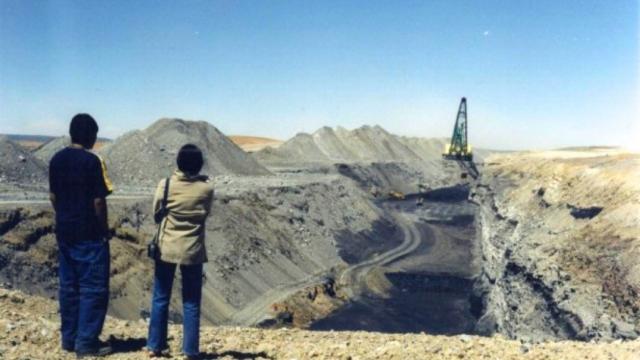
“I grew up without running water,” Nichole Alex, a young woman from Dilkon, Ariz., says in a video released by the activist group Black Mesa Water Coalition. Alex grew up on the Navajo reservation in the rural Black Mesa region of Arizona, where for decades a controversial coal mine emptied the region’s aquifer, leaving local wells dry.
“I grew up traveling 20 miles to gather water,” Alex continues. “That’s not fair, that my community is being sacrificed to power the valley here.”
In 1970, the Peabody Coal Company began mining on the reservation. Although tribal members were initially enthusiastic about the jobs the mine would provide, over time the relationship grew rocky. The company built a coal slurry pipeline that cut straight through the reservation and pumped billions of gallons of water from the Navajo Aquifer.
Peabody mixed the water with coal and pumped the fluid mixture to a power plant in Nevada where the coal was burned to generate electricity for the nearby cities of Phoenix and Tucson, as well as other parts of the Southwest. But local people like Alex were left without access to water.
It’s a story echoed around the country: From the East Bay in California to the mountains of Appalachia, fossil fuel companies have drilled, burned, and mined their way into towns, cities, and rural areas—especially communities of color, as well as indigenous and low-income ones—disrupting the lives of people and damaging the environment.
But local residents have fought back. In 2001, Navajo and Hopi youth created the Black Mesa Water Coalition to stop the depletion of the Navajo Aquifer. They educated their peers and neighbors about the problem, and eventually persuaded the Navajo Tribal Council to cut off Peabody Coal’s access to the aquifer. That work, combined with a lawsuit that charged Peabody with violation of the Clean Air Act, helped to force the shutdown of the Black Mesa coal mine in 2005.
The problem with that outcome was that it left many residents of the reservation without jobs. About 300 Navajo and Hopi people had worked for Peabody, according to the advocacy group Cultural Survival . Efforts by the Black Mesa Water Coalition and its allies to create green jobs through traditional livelihoods, like wool-making and farming, have made only a small dent in the unemployment rate, which hovers around 50 percent. Furthermore, the land where the coal mine had been is not suitable for living or farming.
The story of Black Mesa illustrates a realization that is sweeping through the network of organizations, individuals, and coalitions working to fight global warming: While the burning of fossil fuels causes climate change, simply shutting down these industries leaves workers and their families behind, and often result in a familiar conflict over “jobs versus the environment.” That in turn prevents many workers and low-income groups from joining the fight against climate change—something movement leaders say they cannot afford.
The late Tony Mazzocchi, a labor leader with roots in the Oil, Chemical and Atomic Workers International Union, advocated the rejection of this dichotomy and called on environmentalists to lobby for what he deemed a “just transition” in situations when environmental policies eliminate jobs. As the Institute for Policy Studies’ Chuck Collins recently wrote in YES!, a just transition “would offer benefits far beyond the pitiful job retraining programs included in trade agreements like NAFTA.”
Now, many climate justice activists are picking up on Mazzocchi’s idea and refusing to be limited by the “jobs or the environment” dichotomy. Among them is Michelle Mascarenhas-Swan, co-director of the Movement Generation Justice & Ecology Project and co-chair of the Climate Justice Alliance. The alliance is a network of 35 organizations working at the intersection of job creation and environmental protection in places like Black Mesa, where residents have been resisting oil rigs, gas wells, and coal plants, in some cases for decades. These organizations create projects that provide stable livelihoods, protect fragile environments, and, ultimately, help speed the transition away from fossil fuels.
“The central solutions to address the climate crisis are not actually going to come from looking up and counting carbon in the atmosphere,” Mascarenhas-Swan said. “They are going to come from remaking the economy, which is the root of this struggle.”
Few have thought more about just how to go about doing that than the 130 member organizations in the New Economy Coalition, which are a part of some would call the “new economy movement.” For many years, these groups have been building worker-owned cooperatives, land trusts, and community financial institutions, all designed to keep wealth local and provide good jobs. Eli Feghali, the coalition’s director of communications and online organizing, says that his members are starting to converge on the same vision as climate justice organizers.
“Folks have been imagining alternatives to capitalism for centuries,” Feghali said. “But a new context is emerging, the center of which is the climate crisis. Our economic system is fundamentally opposed to a livable future.”
Feghali says new economy groups can contribute to the push for a just transition by helping groups like the Black Mesa Water Coalition start worker-owned cooperatives and by lobbying for policies that support cooperative economies.
The new economy movement has some work to do in the way of diversity and representation of people of color and those from low-income areas, Feghali acknowledges. But, he says, “the good news is that these groups are already building alternatives and providing leadership.”
That leadership can been seen back in Arizona, where the Black Mesa Water Coalition is moving forward on a 1- to 5-megawatt solar power plant proposed for the site of the abandoned coal mine. And here’s where new economy ideas come in: The coalition hopes the facility will be owned and controlled by the Navajo people and will provide reliable jobs.
“We were once the battery for the Southwest [with our coal production],” said Roberto Nutlouis, the Black Mesa Water Coalition’s green economy coordinator. “Why not convert these reclaimed lands into something more sustainable and healthy for our community?”
The proposed project would use the money made from the utility-scale solar plant to create local reinvestment funds that would then support wool production and food sovereignty projects, whereas Peabody’s profits mostly benefited faraway shareholders.
“There’s a deeper way of valuing things, beyond a capitalist way,” Nutlouis said. “We need an economy that restores the health of our people and the health of our land.”
If efforts like this work in Black Mesa, they could help to blaze a trail out of the climate crisis that workers can get behind.
3 WAYS TO SHOW YOUR SUPPORT
- Log in to post comments
















